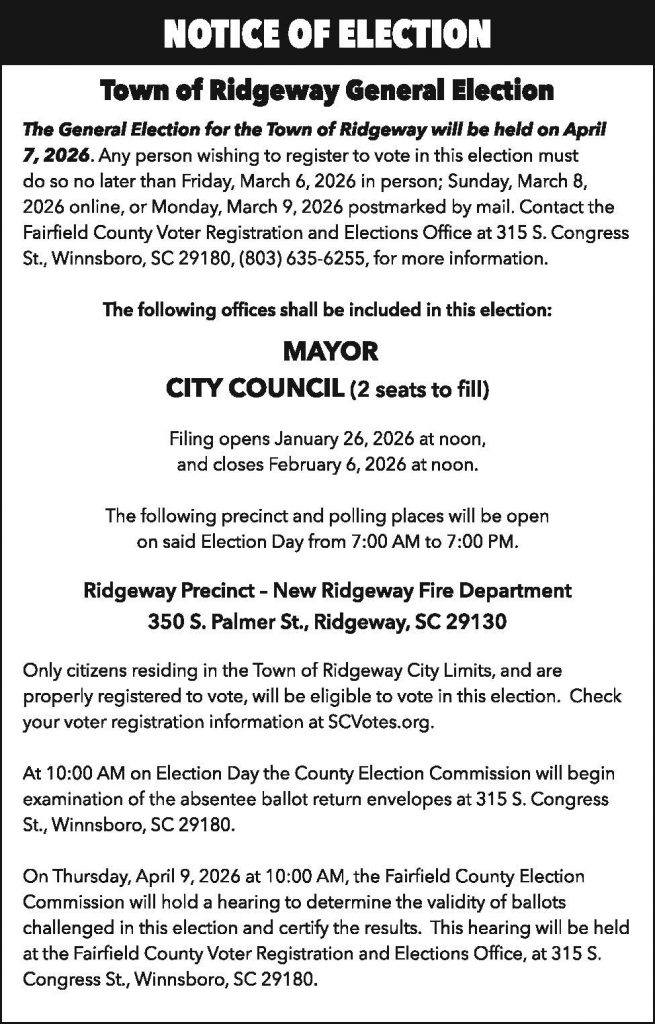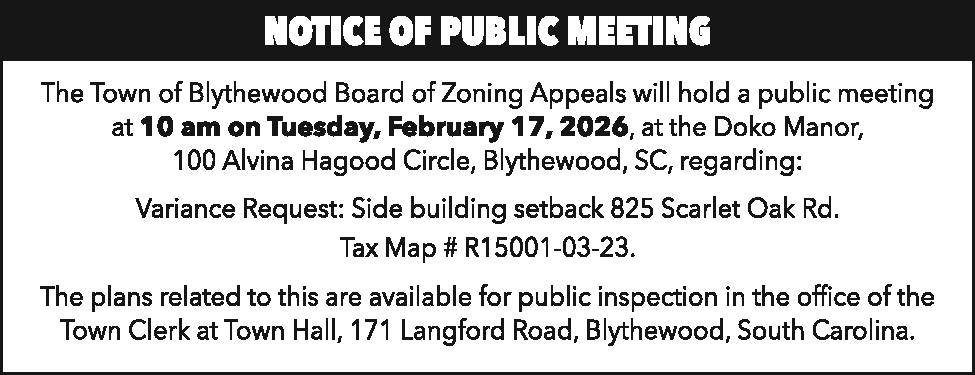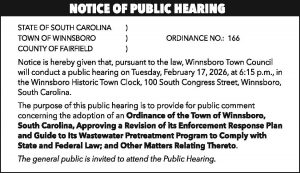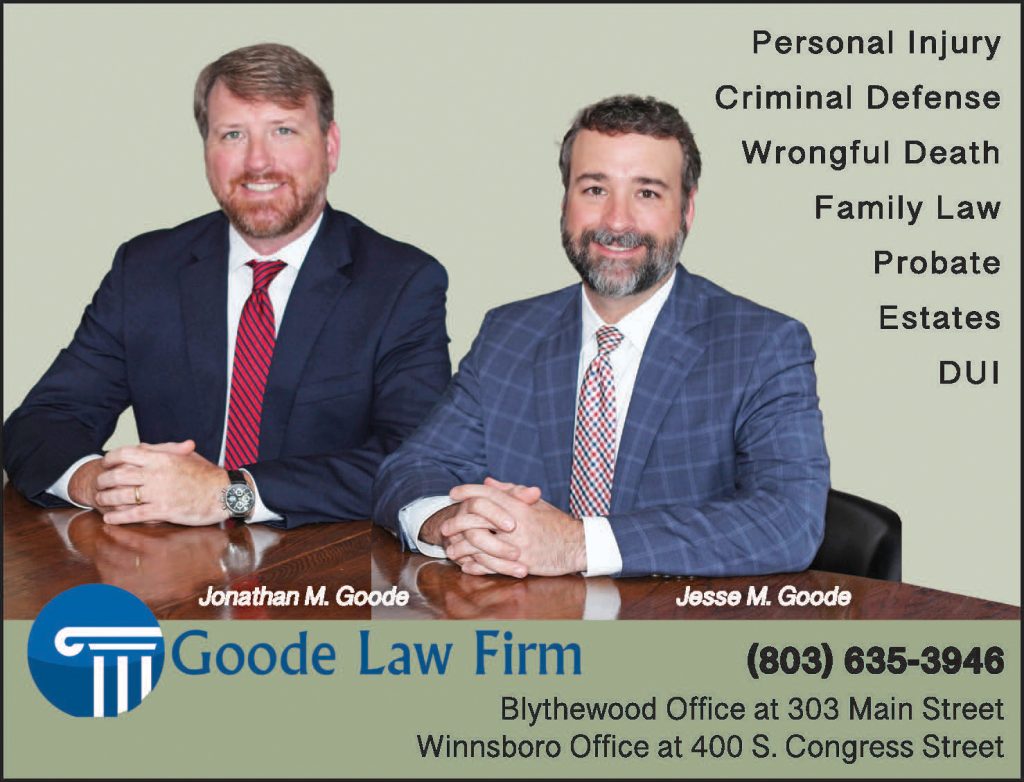Next Information Session set for 6 p.m. on July 14 at Doko Manor
BLYTHEWOOD – “While one form of government may describe, specifically, what our [council’s and mayor’s] individual roles are, it’s like a marriage. If I cannot on a daily basis communicate effectively with my wife, our marriage is not going to be successful. If the people in these [council and mayor] roles cannot work together, they’re not going to be effective.”
That was the message Monday morning from Charlie Barrineau, Senior Field Services Manager with the Municipal Association of South Carolina, during an informational meeting for members of the Blythewood community held at Doko Manor concerning the upcoming referendum on changing the Town’s form of government.
In the referendum (vote) set for July 29, Blythewood voters will go to the polls to decide whether they want to maintain the mayor-council form of government they have now (with a ‘No’ vote) or change to a council-manager form (with a ‘Yes’ vote). If they vote to change it, the new council-manager form of government will go into effect on the fourth Monday of November, 2025.
The town manager does not have the authority to change the bottom line. That is still a policy decision made jointly by council members and the mayor.
Charlie Barrineau, MASC
Senior Field Services Manager
With misinformation spreading across Facebook like wildfire, Barrineau was asked by the Interim Town Administrator Ed Driggers to give the community objective information about the two forms of government.
During Monday’s meeting, Barrineau, who served as city manager of Greenwood for almost 10 years and worked in a council-manager form of government for 18 years, shared information about each of South Carolina’s three forms of government: the mayor-council form, the council-manager form and the council form.
Because the third form – the ‘council’ form of government is not relative to the July 29 referendum, it will not be discussed in this article.
Throughout his presentation, Barrineau emphasized that all three forms of government can and do work well, but that all three can and do have problems.
He also pointed out that of the 271 towns and cities in South Carolina, most of them are extremely small – 122 have less than a 1,000 population, 206 have less than the population of Blythewood, and 230 towns have less than 10,000 people. Only 41 towns in the state exceed the 10,000 population.
“These [smaller towns and cities] typically are mayor-council forms of government (as in Blythewood). There is some preference in the larger communities for the council-manager form of government,” Barrineau said.
“Blythewood is unique in that you don’t have a lot of services that we see in many of our municipalities, but you’re getting into the middle population size, the medium-sized communities,” he said, noting that Blythewood is one of the fastest growing towns in South Carolina. “You’re probably growing in a direction where you may be able to afford some services in the future.”
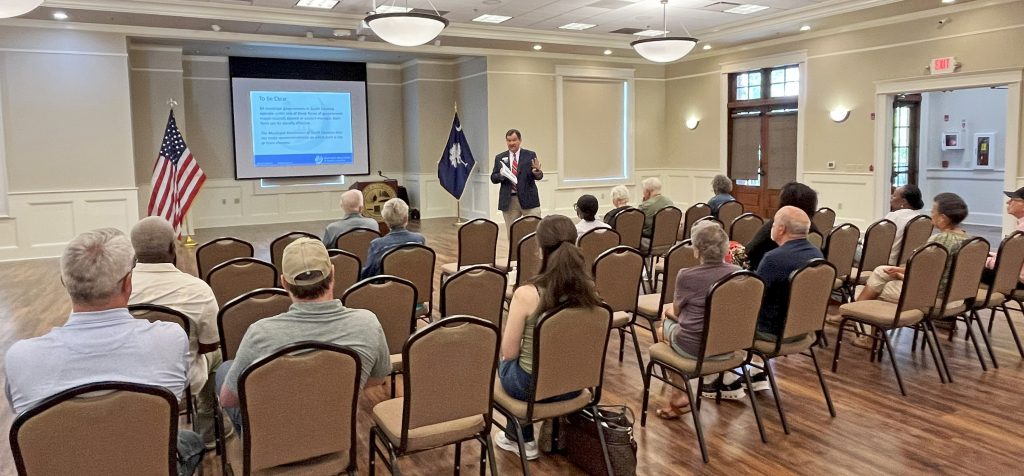
Forms of government used by smallest and largest S.C. towns
Of the 135 towns that have mayor-council forms of government, 85 have populations under 1,000, and 3 have populations over 25,000.
Of the 102 towns that have council forms of government, 36 have populations under 1,000, and 3 have populations over 25,000.
Of the 34 towns that have the council-manager form of government, 1 town has a population under 1,000, and 11 have populations over 25,000.
Here’s what Barrineau had to say about the two forms of government Blythewood residents will be voting on.
In all three forms of government, the legislative function remains with the council (which consists of the mayor and the other council members). The major difference in the three forms is where the executive and administrative powers and responsibilities of the local government are vested.
Mayor-Council Form of Government
Under the mayor-council form of government, the council (which, in all three forms of government, always consists of the mayor and the other council members) is the legislative body. Collectively, the majority of the body sets the Town’s policies for the community. A majority of council also selects or appoints a city attorney, city judge, clerk to council, and they have authority over and approve the budget, which is the foundation of their policies, according to Barrineau.
Barrineau emphasized several times throughout his presentation that the term council always includes both the mayor and all the other members of council. The mayor is never separate from the council in any of the three forms of government.
“In the mayor-council form of government, the mayor is, specifically, the presiding officer of council and chairs the meetings, by law; serves as the chief executive officer; is charged with running the day-to-day operations of the town; has oversight of all the departments and staff; and prepares the annual budget and monthly financial statements and submits them to council.”
Barrineau pushed back against the use of the term ‘strong mayor.’
“I do not use the term ‘strong mayor’ in training classes,” he said. “I think it gives the perception that the mayor may have more authority than he or she does.”
“These are the official responsibilities of the mayor and council ‘on paper,’” Barrineau said. “Now let’s talk about how this works in reality.”
He gave an example of the mayor’s responsibility under state law in the mayor-council form of government where the mayor appoints department directors, and he used the hiring of a police chief for illustration.
“The police chief is a very, very public position, maybe more so than the mayor. There are some mayors who would take the position that, ‘Well, the law says that it’s my call. I make the decisions. I’m going to appoint this person.
“That’s what the law says,” Barrineau said. “But here’s where we need to dance, and where the marriage comes in. We’ve also got four council members. They’re elected officials, too. And so, in this relationship, if we fail to communicate to the body what we’re doing, we’re not going to be successful – I see it across the state and could give you many situations,” Barrineau said.
“If the council’s not aware of the hire, and [one of them] goes to the grocery store and someone taps [that council person] on the shoulder, saying …’I hear we have a new chief of police. Tell me about him/her.’ Well, if that mayor went down that path of, ‘Well, it’s my authority,’ …I can tell you what my wife tells me when I think I have the authority. She puts me in my place,” Barrineau said. “I’m just trying to explain the reality of the forms of government.
“When there’s communication and when all these folks have a servant mindset and are trying to do what is right, beautiful. The dance can work.”
The mayor cannot be fired by council or unelected at any time by the voters. If the public becomes disenchanted with the mayor or a council member, those council members and the mayor are allowed to continue in their elected seats until their terms expire.
Council-Manager Form of Government
“The council-manager form of government grew out of the early 1900’s in what we refer to as the progressive movement,” Barrineau said. “That was a time when the big cities were controlled by the mafia. The mafia was trying to run it so that the mayor could say, ‘Get this person a job.’ With the council-manager form of government, we’re trying to get that [kind of hiring] out of this system,” Barrineau said.
He explained that, when he served as a town manager, if his mayor or council member asked him to hire someone, he would put that person’s name into the group of people applying and would try his best to interview that individual with the same lack of bias that he would the other applicants.
In the council-manager form of government, the town manager (also referred to as town administrator as in Blythewood) is the chief executive officer. He hires, fires, and oversees staff, including the town clerk; affixes salaries that are specified in the budget; and can have the authority – if granted by council – to move money between departments or line items.
“But the town manager does not have authority to change the bottom line. That is still a policy decision made jointly by council members and the mayor,” Barrineau said. “In addition to preparing and submitting the budget to council, the town manager also prepares and submits monthly financial statements to council.
“If council is not receiving monthly financial statements, we’ve got to stop and figure out what’s going on,” he said. “Of all the challenges we see in our local government, that is the number one challenge.”
Barrineau also explained that the council and mayor jointly retain all authority to appoint the town’s boards and commissions.
“The town manager can advise council on policies and departments, but it’s the council’s decision to continue a policy or to add or eliminate a department,” Barrineau said.
“In any sensitive position, the town manager is going to be communicating with all council members, not just one, but all, saying: ‘You know, Mr. Mayor, Ms. Councilwoman, I’m getting ready to terminate this or that employee …’ The manager will want to give a heads up to that elected official who has to go to church and to the grocery store in the community and would need to know what’s going on.”
While the mayor has no formal authority under state law beyond that of serving as a member of council, he/she presides at meetings of council by tradition and may exercise “informal” authority as leader of council/staff and as spokesperson for the council.
As an example of this, Barrineau referenced the influence of Columbia’s Mayor Rickenman who operates under the same form of government the Blythewood mayor would operate under if the referendum passes. Because of Rickenman’s popularity and his ability to speak and communicate with the public, he is generally considered, like influential mayors Benjamin and Coble before him, to be the spokesperson for the City of Columbia.
While a town manager/administrator can be fired at any time by council and the mayor jointly, the mayor cannot be fired by council. He/she is allowed to serve however many years until his term is up.
Barrineau will conduct a second informational meeting for Blythewood residents on Monday, July 14, at 6 p.m., at Doko Manor.
Breaking Down the Forms of Government
South Carolina law allows municipalities to organize under one of three forms of government. It also allows municipalities to change the form of government by referendum.
Although each of the three forms have unique structures, some things remain the same in all instances. For example, in all three forms of municipal government in South Carolina, all legislative and policy making authority rests with the council. All councils must meet at least one time per month and comply with the notice and agenda requirements in the SC Freedom of Information Act. In all cases, the mayor, or a majority of council, can call special meetings.
Full information is available in the Forms and Powers of Municipal Government handbook, along with a list of which municipality has which form of government. Here are some basics for the form of government Blythewood currently operates under and the form the residents are being asked to vote for:
Mayor-council (Blythewood’s current form of government)
SC Code Title 5, Chapter )
The council has four or more councilmembers, plus the mayor
- holds all legislative and policy power.
- can hire an administrator to “assist the mayor in his office.”
- appoints the municipal clerk, attorney and judge.
- adopts the balanced budget, which is prepared for council by the mayor.
The mayor
- votes as a member of council and presides over council meetings.
- serves as chief executive officer, supervising departments, as well as appointing and removing employees in accordance with personnel rules adopted by council.
- prepares and submits the budget and capital program to council, and makes the annual financial report to the public and to council.
Council-manager (the proposed form of government for Blythewood)
SC Code Title 5, Chapter 13
The council
- has either four, six or eight council members, plus the mayor.
- holds all legislative and policy power.
- employs a manager, attorney and judge.
- adopts a balanced budget, which is prepared for council by the manager.
The mayor
- has no additional power compared to other council members.
- has no administrative responsibilities.
- presides at council meetings by tradition, not statutory authority.
- may exercise informal authority as leader of council and staff as spokesperson for the council.
The manager
- serves as chief executive and head of the administrative branch, appointing and removing employees, including the clerk, and setting salaries.
- prepares and administers the annual budget and makes financial reports.
- advises council on departments and appointments.
- performs administrative duties only if authorized to do so by council.
- presides at council meetings by tradition, not statutory authority.
- may exercise informal authority as leader of council and staff as spokesperson for the council.








